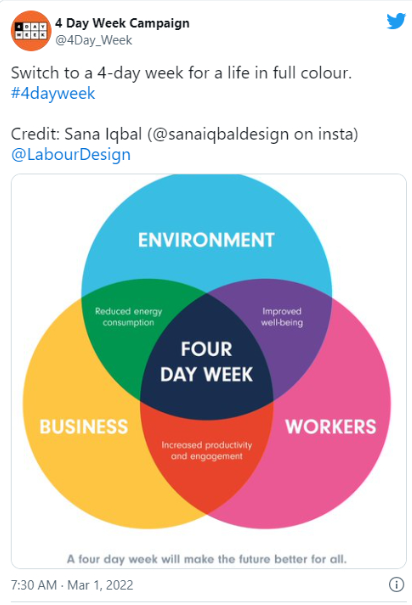How do you think a shorter working week UK sounds?
To some, the shorter workweek is being viewed as the future of improved employee productivity and a better work-life balance.
The 5-day working week has been the expectation for most of us for over a century and any alterations would be considered as a profound shift on the way we live. It is, however, a change which has been suggested more regularly over recent years. Labour in their 2019 General Election manifesto included plans for a 32-hour working week with no loss of pay.
The global pandemic has certainly made a difference in the way we view our working lives. Many firms within the UK already believe A shorter working week UK will lead to an improvement in staff retention alongside job satisfaction and the ability to attract new staff.
The sign-up
During the first week of April, over 3,000 workers at 60 companies in the UK announced their intention to take part in a four-day short working week trial – one of the biggest steps in the industry anywhere in the world. Those taking part include many from a range of charities and businesses. Some of which include the Royal Society of Biology and a Manchester-based medical devices firm.
Probably the most important point to mention is that this change comes with no loss of pay to anyone.
The UK pilot programme reflects a growing focus on more flexible ways of working worldwide, with similar schemes due to take place in Canada, USA, Ireland, New Zealand, Iceland and Australia at the same time.
Companies in the UK believe by adopting this approach they will gain high productivity from staff and momentum as a way of improving working conditions. Also, it is hoped this will result in improved job satisfaction and aid in dealing with staff absences.
To read about our previous article on dealing with the absence of staff and filling gaps in your business click here.
The most recent trial to take place was organised by Reykjavík city council and the national government of Iceland. The trial in Iceland was initiated to see how employment patterns might work at a broad range of companies across the economy.
A number of companies to have already tried the shorter working week include the FTSE 100 consumer goods firm Unilever, major Japanese electronics firm Panasonic and the London app-based Atom Bank.
Mark Downs, the chief executive of the Royal Society of Biology, said the decision to trial the four-day working week was due to a response to an “incredibly competitive labour market within the UK. “It’s about trying to do more to be a good, innovative employer to attract and retain our current staff,” he said. “These sorts of possibilities make a massive difference. It’s great for everybody.”
The majority of the society’s staff mostly work in King’s Cross, London but some employees have moved to remote working since the pandemic. Employees at the society said their responses were universally positive, even with the thought of an agile or hybrid working approach coming into play.
The society will remain open five days a week, but with workers generally split between Monday-to-Thursday and Tuesday-to-Friday shifts as part of the implementation of a shorter working week UK.
While the idea of a reduced week might sound revolutionary, it certainly isn’t unique to our country. It’s also being considered around the world where it’s seen to be a good way to boost tourism. Calls came after New Zealand’s prime minister, Jacinda Ardern, suggested employers should consider a four-day working week in response to the Covid-19 crisis which she believes would “certainly” boost their tourism industry.
During the pilot which is set to take place between June and September, businesses will work with researchers to record the impact on productivity and wellbeing. Researchers will also track the impact of this on the environment and gender equality.
A shorter working week UK has certainly been on the radar for a while.
What is the 4 Day Week Campaign shouting about?
Campaigners say that a four-day working week brings a whole plethora of alleged benefits, tackling unemployment, health and wellbeing and even the climate crisis.
As a result of having to work fewer days, employees have a longer time to recuperate before returning to work and have more time to spend with families and friends.
Top doctor John Ashton believes that a four-day week – without loss of pay – could “reduce employee sickness, improve morale which would improve the productivity of their workers.”
Ashton has also highlighted the benefits a shorter week would have on family life in the UK, as well as creating more time for people to participate in voluntary activities for the betterment of their local communities.
Staff labour shortages are hitting many sectors of the UK economy including, hospitality, transport, education and the NHS, putting pressure on employees to deal with increasingly unsustainable workloads.
Work smarter, not longer
Microsoft Japan implemented a four day back in August 2019 in which they gave 2,300 employees five Fridays off in a row. The company claimed that productivity leapt by 40%. This came because workers were not only happier with the extra day off but also meetings were more efficient. They also noted the environmental benefits too: electricity consumption fell by 23 per cent, and staff used 59 percent less printer paper.
In Iceland, a four-day working week trial was carried out between 2015 and 2019 and labelled an “overwhelming success” by researchers. The results showed that productivity at work stayed the same or even improved when working hours were cut. The Icelandic researchers also saw that men who took part in the trial were also more likely to take on household chores (to much delight of their partners!)
Which organisations are offering a four-day working week as part of the trial in the UK?
Sixty firms based in the UK will participate in the trial, but just 28 have agreed to be publicly named. (So get your CVs ready if you want to reap the benefits!)
These employers include:
Girling Jones – recruitment firm
AKA Case Management – case management firm
IE Brand & Digital – marketing company
Helping Hands – at-home care services
Trio Media – marketing agency
Literal Humans – marketing agency
Physiquipe – rehabilitation tech firm
Tyler Grange – landscape planning consultancy
Timberlake Consultants – software engineering firm
Royal Society of Biology – professional body
Everledge – tech firm
Hutch – game developers
Yo Telecom – telecoms services
Adzooma – online marketing company
Pressure Drop Brewing – brewery
Happy – workplace consultancy services
Platten’s Fish and Chips – chip shop in Norfolk
Eurowagens – car parts retailer
Bookishly – online book and gifts shop
Outcomes First Group – education and foster care services
NeatClean – eco cleaning products firm
Stemette Futures – education organisation
Comcen – computer supplies retailer
We Are Purposeful – activism organisation
5 Squirrels – skincare branding consultancy
Salamandra – animation studios
Scotland’s International Development Alliance – industry body for Scottish charities
Amplitude – tech firm
The companies involved in the trial will be offered a package of support including workshops, mentoring, networking and access to world-class academic research.
Researchers will work alongside other organisations to measure the well-being of workers, the impact on productivity and the impact on gender equality and the environment.
Joe O’Connor, pilot programme manager for 4 Day Week Global, believes 2022 “will be the year that heralds in this bold new future of work”.
He added: “More and more businesses are moving to productivity-focused strategies to enable them to reduce worker hours without reducing pay.”
“The four-day week challenges the current model of work and helps companies move away from simply measuring how long people are ‘at work’, to a sharper focus on the output being produced.”
Is your business looking to implement a shorter working week UK?
We can help you with deciding if this is a viable option for your organisation. If you’re not a fan yourself – let us know why. Maybe we can figure out an alternative to increase productivity and get your employees back in the game.
Speak to one of our dedicated Azimuth experts today and implement your own, tailored approach. You can reach us at enquiries@azimuth.eu.com or call 01483 24 33 81.



